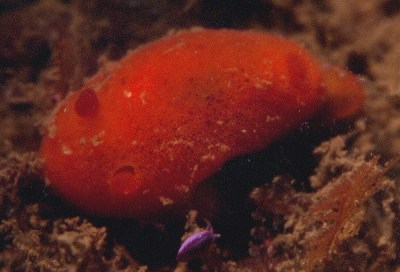Rostanga spp.
Order: NUDIBRANCHIA
Suborder: DORIDINA
Family: Dorididae
See messages below concerning red dorids which are probably species of Rostanga.
Authorship detailsRudman, W.B., 1999 (May 1) Rostanga spp. [In] Sea Slug Forum. Australian Museum, Sydney. Available from http://www.seaslugforum.net/find/rostspp
Related messages
Rostanga from South Africa
August 15, 2002
From: Valda Fraser

Dear Bill,
A "new" orange one! Have you any ideas?
Locality: Pumula, south coast KwaZulu-Natal, South Africa, 28m
Date: July 2002
Size: 12mm
Thanks.
Regards
Valda Fraser
valdafraser@mweb.co.za
Fraser, V., 2002 (Aug 15) Rostanga from South Africa. [Message in] Sea Slug Forum. Australian Museum, Sydney. Available from http://www.seaslugforum.net/find/7737Dear Valda,
It seems to have a 'furry' back so the most likely identification is that it is a species of Rostanga. Garovoy et al (2001) recently described the similarly coloured Rostanga elandsia from South Africa, but it was from the Atlantic coast while your is from the Indian Ocean coast. Yours also does not show the small brown spots visible in their species.
As I say quite often, most species of Rostanga are orange-red in colour and can only be properly identified by looking at their anatomy, in particular their radula. I suspect your animal is one of the Indo-West Pacific species, such as R. bifurcata, but there is no way of knowing from a photo.
• Garovoy, J.B., Valdés, A., & Gosliner, T.M. (2001) Phylogeny of the genus Rostanga (Nudibranchia), with descriptions of three new species from South Africa. Journal of Molluscan Studies 67: 131-144.
Best wishes,
Bill Rudman
The Genus Rostanga
February 8, 2002
From: Bill Rudman
I promised some time ago to post some material on the Indo-West Pacific species of Rostanga. The recent excellent photos of Rostanga risbeci from Japan and some other queries I have received have been the catalyst. Today you will find a number of Rostanga messages and new pages/ Fact Sheets on the following species. In most cases there are also pages on the radula and anatomical features.
I plan some more general pages on this fascinating genus in the near future. Any more contributions on the genus will be gratefully received.
Cheers,
Bill Rudman
Rostanga orientalis? from Japan
March 12, 2000
From: Yasuhiro Shirai


Dear Bill,
I attached 2 image file in this mail. I think this animal is Rostanga sp perhaps Rostanga orientalis?.
Could you please identify it for me?
Data:
Location: Shima Pref. Mie, Japan (Kii Peninsula, east coast)
Length: 20mm
Water temperature: 15C
Date Feb.2000
Depth: 3m Crawling on rock.
Best regards,
Yasuhiro Shirai
yasuhiro@e-net.or.jp
Shirai, Y., 2000 (Mar 12) Rostanga orientalis? from Japan. [Message in] Sea Slug Forum. Australian Museum, Sydney. Available from http://www.seaslugforum.net/find/2059Dear Yasuhiro,
Your animal is definitely a species of Rostanga and could easily be Rostanga orientalis, which has similarly shaped rhinophores, and can have scattered white and/or brown specks.
Unfortunately, species of Rostanga are quite difficult to separate on external characters, although very simple to distinguish anatomically. All the species we have information on are also easy to distinguish on the shape of their egg masses.
So at this stage all I can say is it is possibly Rostanga orientalis.
Best wishes,
Bill Rudman.
Species of Rostanga from Kerama Islands
May 1, 1999
From: Rie Nakano


Dear Bill,
Here are two more of Mr Atsushi Ono 's images from Kerama Island, near Okinawa which you offered to identify for us.
UPPER: from inner reef, Depth:5m, Length:3mm
LOWER: on the coral reef, Depth:7m, Length:30mm
Rie Nakano
rie@street.ne.jp
Nakano, R., 1999 (May 1) Species of Rostanga from Kerama Islands. [Message in] Sea Slug Forum. Australian Museum, Sydney. Available from http://www.seaslugforum.net/find/814Dear Rie,
I think these are probably two different species of Rostanga. Species of the genus are usually red or orange and have spiculate 'bristles' on their back. Some species, lie in the bottom picture have a few upright gills which form a closed cylinder. Often the rhinophore shape is a good way to distinguish species, but the only sure way is to look at the shape of the radular teeth..
Best wishes,
Bill Rudman.
